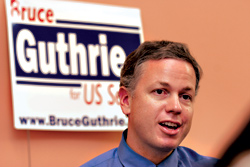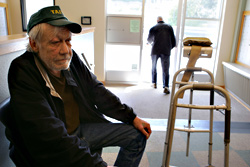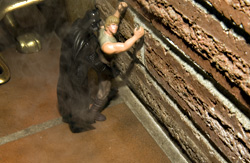TO THE SURPRISE of few in local media, the unofficial Washington News Council on Saturday, June 14, dinged KIRO-TV for journalistic infractions in its infamous downer-cow stories of last fall. The series by investigative reporter Chris Halsne alleged that cows too sick or injured to walk into slaughterhouses were a potential source of E. coli contamination in the food supply and were treated inhumanely, and that the U.S. Department of Agriculture was turning a blind eye to it all. After hearing two hours of testimony by industry complainants and reviewing Halsne’s series, the council, composed of media professionals and lay people, voted on nine questions pertaining to the accuracy, fairness, and balance of the series. The 15 members of the council who were present found KIRO at fault on all but one of the questions.
KIRO declined to participate in the council process and issued a searing statement afterward, claiming “the council’s agenda was not to determine whether the stories were factually accurate, but whether they met some vague concept of fairness asserted by the beef and dairy industry cheerleaders.” While correctly pointing out that “no media entity has ever appeared at one of the commission’s hearings,” the KIRO statement contended that the station’s reports “were factually accurate.”That might be true in the strictest sense. But Halsne’s original reports last Oct. 31 and Nov. 1 indeed lacked supporting evidence (see “Journalistic Downer,” May 28), especially with regard to an E. coli connection.
FOLLOW-UP REPORTS last week, in which KIRO fired back at the Washington State Beef Commission and the Washington Dairy Products Commission, seemed to be an opportunity to clarify an E. coli connection, but still Halsne presented no such evidence. In a written response to the news council’s complaint, KIRO says that it never linked E. coli and downer cows. But a clear-eyed examination of the original series shows that KIRO did connect E. coli and downersif not explicitly, then through the use of images and interviews. To his credit, Halsne last week finally offered evidence that downer cows might not have been treated inhumanely at Midway Meats, a Chehalis slaughterhouse where KIRO shot undercover video of downers last year.
After the original series, the beef and dairy commissions filed a complaint with the little-known news council, after taking their gripes to KIRO and getting no answer. Midway Meats joined the state-chartered commissions in complaining. Last month, as the council’s hearing date neared, Seattle Weekly and the Seattle Post-Intelligencer published stories essentially agreeing with the complaints about KIRO’s stories. Since, Halsne twice has spoken on talk radio to defend his work. Halsne’s essential argument has been that he had sufficient evidence to make his allegations about downer cows, even if he didn’t reveal that evidence to viewers in the series as it aired.
He also told KVI-AM listeners that an Oklahoma City defamation judgment against him and KWTV-TV, his former station, had been thrown out, with a new trial ordered. Actually, the Oklahoma Court of Civil Appeals ordered a new trial to refigure the monetary awardwithout changing the libel verdict against Halsne and KWTV.
Last week’s updates to the downers story mostly were an attempt to rebut, in advance, the news council’s complaint. For example, Halsne spent much time alleging that the beef and dairy commissions were working with both the state attorney general’s office and the Washington Department of Agriculture to discredit KIROand that they were using taxpayer money to do so. Both commissions receive their funding from state-levied user fees, though not from general taxpayer money. Officials at both say their only contact with the other agencies was to determine how to respond properly to a public-records request made last month by KIRO and, in the beef commission’s case, to solicit the views of State Veterinarian Robert Mead on whether there were violations of the federal Humane Slaughter Act, based on Halsne’s undercover video.
SOME NEWS COUNCIL members praised KIRO for its willingness to tackle weighty subjects, such as the safety of the food supply, but wished Halsne and the station had done a better, fairer, more accurate job. “I think Chris Halsne tried to be Mike Wallace, but I think it came out like a shoddy 60 Minutes,” said Sue Frause, a former columnist for the South Whidbey Record and a member of the council. For its part, KIRO in its statement said the news council proceedings “were nothing but attempts at censorship.”
In an interesting coincidence, KIRO announced on Monday, June 16, that it had won a national award for overall excellence among major-market television newscasts from the respected Radio- Television News Directors Association. KIRO spokesperson Kristina Moy says the downer series was not among the stories KIRO used to convince the RTNDA of its excellence.







